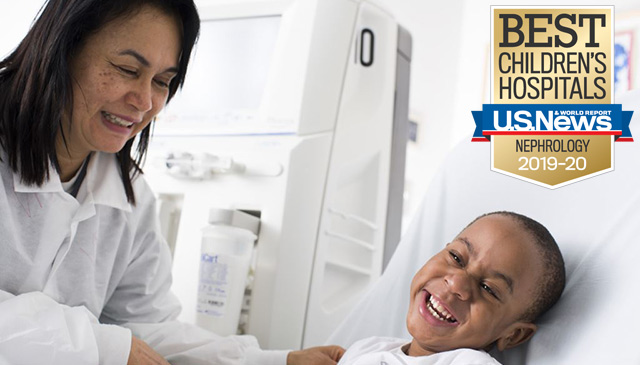
When the results of the 2019 U.S. News & World Report survey of Best Children’s Hospitals poured in on June 18, Nephrology patiently waited to find out if they would again be named among the best in the nation.
For the first time, Texas Children’s is ranked in the top 10 in each of the U.S. News & World Report-recognized pediatric sub-specialties. Nephrology, moved up a spot from last year, ranking No. 2.
“We were all very pleased,” Chief of Renal Services Dr. Michael Braun said. “The entire multidisciplinary team has a tremendous focus on making sure we deliver the best and safest care possible, and so seeing that reflected in our U.S. News & World Report rankings is wonderful.”
The U.S. News rankings uses an approach that analyzes quality of health care and patient outcomes data from thousands of medical institutions across the country. This includes measuring specialized clinics and programs, external accreditations and compliance with best practices. Improved rankings determine a health care organization’s commitment to not only providing high-quality care, but also to identifying gaps where improvements are needed.
“We are excited because it validates what we already know about the program,” Renal Programs Manager Helen Currier said. “Our goals haven’t changed, and we are going to continue to provide outstanding care to patients with kidney disease in a safe and family-centered context.”
Big wins for patients and families
This past year, Nephrology exceeded their yearly goals and executed additional initiatives to increase transparency, reduce risk of infection, and improve the quality of care.
- Significant decrease in hemodialysis catheter associated blood stream infections (BSI)
Hemodialysis catheter associated BSIs are complications that can result in hospitalization and possibly death. Minimum standards are set by the federal government, as a result metrics are analyzed monthly to identify improvements at a system level. Minimizing these infections is an example of our commitment to providing the best possible care for our hemodialysis patients.
The Standardized Care to Improve Outcomes in Pediatric End-stage Renal Disease (SCOPE) collaborative focuses on infections prevention in pediatric peritoneal dialysis and hemodialysis patients using large-scale collaboration to identify and spread effective interventions across pediatric care settings. Adopting and following SCOPE played a large role in this big win as well.
- Increased number of full-time equivalents (FTEs) Psychologist/Psychiatrist dedicated to the care of pediatric maintenance dialysis patients in Pediatric Nephrology Program
FTEs are licensed, doctoral psychologists or psychiatrists who work more than 30 hours per week. The burden of illness is the highest among all pediatric chronic illnesses, Texas Children’s Hospital has led the nation as a proponent of integrated mental health support to patients, and families with end-stage renal disease (ESRD).
- GRAFT Survival rate of 1 year kidney transplant
Graft survival is an estimate of the probability of the transplant functioning at a finite time after transplantation. According to the National Center for Biotechnology Information, outcomes after pediatric kidney transplantation in the United States have improved over time, independent of changes in recipient, donor, and transplant characteristics.
Not only is the first year that Texas Children’s Hospital leads the nation in the number of pediatric kidney transplants, but we also celebrated the 500th kidney transplant done at Texas Children’s Hospital. This is not only reflected in our U.S. News ranking, but has been a major impact on the well-being of our patients. Texas Children’s transplant team as a whole goes above and beyond to provide high quality care to our patients. Last year, they received a glowing review from the Centers for Medicare and Medicaid Services recertification evaluation team. More specifically, the fantastic work that the kidney transplant team has done is reflected in this esteemed honor in the U.S. News & World Report survey.
- Improvement in Children under 5 years of age receiving hemodialysis
Dr. Braun attributes this improvement in outcomes in large part to the impressive work of Dr. Michael Belfort and the Fetal Center in developing an outstanding maternal fetal medicine program. Texas Children’s Fetal Center is one of the nation’s leaders in the diagnosis and treatment of abnormalities in unborn and newborn infants, allowing us the ability to care for a child even before birth which directly impacts their quality of care later in life.
Click here to learn more about our Kidney (Renal) department at Texas Children’s Hospital.

